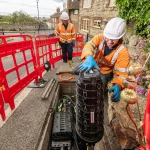Scotland Create Infrastructure Commission to Build 30 Year Strategy
The Scottish Government has today completed the establishment of a new Infrastructure Commission for Scotland (ICS), which aims to develop a 30 year strategy in order to advise on improvements across key infrastructure areas such as transport, energy, water, broadband (internet) and telecoms.
The final members of this commission, which is to be chaired by Ian Russell CBE, have now been appointed and will seek to provide “independent, informed advice on the vision, ambition and priorities for infrastructure“. The newly appointed commissioners are Professor Iain Docherty, Ken Gillespie, Benny Higgins, Mary Pitcaithly OBE, Rachel Skinner, Grahame Smith, Sara Thiam, John Trower and Professor Janette Webb.
Initially the ICS will focus on the development of the Scottish Government’s next Infrastructure Investment Plan (IIP) to run until 2023, although it will also look toward building a broader strategy for the next 30 years. Apparently its first report on infrastructure ambitions and priorities is expected to be published by the end of 2019, which should include some interim recommendations to support the evolution of a “coherent” plan.
Advertisement
Michael Matheson, Cabinet Secretary for Infrastructure, said:
“I am delighted the Infrastructure Commission is starting its work. Together the members bring a wide and balanced range of skills and insights. It has a key role in advising Scottish Ministers on strategic investments to boost inclusive economic growth, improve services and support delivery of Scotland’s low carbon objectives.
We know the value of investing in infrastructure goes beyond the physical homes, schools and hospitals we see in everyday life. It also unlocks economic potential, supports jobs and allows our businesses and communities to strengthen and grow. And it plays a crucial role in connecting our people, businesses and communities.
Under our new National Infrastructure Mission, Scottish Ministers have committed to steadily increase annual investment so it is £1.56 billion more in 2025-26 than in 2019-20, meaning more than £25 billion in infrastructure investment through the next Parliament.
It is really important stakeholders and people across Scotland have their say about what is needed and how it might best be delivered. The open engagement the commission will undertake will ensure high quality advice and help us put in place the best infrastructure for Scotland’s needs.”
At this point it’s worth noting that the UK Government has already established a National Infrastructure Commission (NIC) and it will be interesting to see whether the advice that gets doled out by the ICS ends up offering anything different from the NIC (so far the NIC has largely supported the UK Government’s existing approach – see here).
Meanwhile we’re currently waiting for the Scottish Government to announce the outcome of their £600m pledge to bring “superfast broadband” (defined in the next contract as 30Mbps+) access to all premises via their future R100 (Reaching 100%) project here and here, which under the original proposal could complete by the end of 2021 (March 2022 as a financial year).
Meanwhile a report published last year cast doubt on the feasibility of the R100 time-scale (here) and there are some concerns about how it might clash with the UK’s new 10Mbps+ Universal Service Obligation (USO). But the USO does contain an allowance for future deployment plans (i.e. you can’t request the USO if another publicly funded plan exists to deliver better broadband to the same area within the next 12 months).
A supplier for the R100 contract is due to be announced next month, although it remains to be seen whether a dispute between some of the potential bidders has caused this to be delayed. In any case we suspect that BT (Openreach) are still the front-runner, despite the process initially also receiving interest from Gigaclear, Axione and SSE Enterprise Telecoms.
Advertisement
Mark is a professional technology writer, IT consultant and computer engineer from Dorset (England), he also founded ISPreview in 1999 and enjoys analysing the latest telecoms and broadband developments. Find me on X (Twitter), Mastodon, Facebook, BlueSky, Threads.net and Linkedin.
« Report Slams Inadequate Rural Mobile Signals and Broadband Lines
Wind Farm Blows Cash for Moray Community Broadband Upgrade »

















































Comments are closed